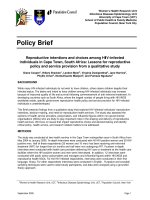Mental Health Policy and Service Guidance Package: ORGANIZATION OF SERVICES FOR MENTAL HEALTH pdf
Bạn đang xem bản rút gọn của tài liệu. Xem và tải ngay bản đầy đủ của tài liệu tại đây (349.75 KB, 86 trang )
ORGANIZATION
OF SERVICES
FOR MENTAL
HEALTH
Mental Health Policy and
Service Guidance Package
World Health Organization, 2003
“
Mental health care should be
provided through general health
services and community settings.
Large and centralized psychiatric
institutions need to be replaced
by other more appropriate
mental health services.
”
ORGANIZATION
OF SERVICES
FOR MENTAL
HEALTH
Mental Health Policy and
Service Guidance Package
World Health Organization, 2003
© World Health Organization 2003
All rights reserved. Publications of the World Health Organization can be obtained from Marketing and
Dissemination, World Health Organization, 20 Avenue Appia, 1211 Geneva 27, Switzerland (tel: +41 22
791 2476; fax: +41 22 791 4857; email: ). Requests for permission to reproduce or
translate WHO publications – whether for sale or for noncommercial distribution – should be addressed
to Publications, at the above address (fax: +41 22 791 4806; email: ).
The designations employed and the presentation of the material in this publication do not imply the
expression of any opinion whatsoever on the part of the World Health Organization concerning the legal
status of any country, territory, city or area or of its authorities, or concerning the delimitation of
its frontiers or boundaries. Dotted lines on maps represent approximate borderlines for which there may
not yet be full agreement.
The mention of specific companies or of certain manufacturers’ products does not imply that they are
endorsed or recommended by the World Health Organization in preference to others of a similar nature
that are not mentioned. Errors and omissions excepted, the names of proprietary products are
distinguished by initial capital letters.
The World Health Organization does not warrant that the information contained in this publication is
complete and correct and shall not be liable for any damages incurred as a result of its use.
Printed in Singapore.
WHO Library Cataloguing-in-Publication Data
Organization of services for mental health.
(Mental health policy and service guidance package)
1. Mental health services - organization and administration
2. Community mental health services - organization and administration
3. Delivery of health care, Integrated
4. Health planning guidelines I. World Health Organization II. Series.
ISBN 92 4 154592 5
(NLM classification: WM 30)
Technical information concerning this publication can be obtained from:
Dr Michelle Funk
Mental Health Policy and Service Development Team
Department of Mental Health and Substance Dependence
Noncommunicable Diseases and Mental Health Cluster
World Health Organization
CH-1211, Geneva 27
Switzerland
Tel: +41 22 791 3855
Fax: +41 22 791 4160
E-mail:
ii
Acknowledgements
The Mental Health Policy and Service Guidance Package was produced under the
direction of Dr Michelle Funk, Coordinator, Mental Health Policy and Service
Development, and supervised by Dr Benedetto Saraceno, Director, Department of
Mental Health and Substance Dependence, World Health Organization.
The World Health Organization gratefully thanks Dr Soumitra Pathare, Ruby Hall Clinic,
Pune, India who prepared this module. Professor Alan Flisher, University of Cape Town,
Observatory, Republic of South Africa, Dr Silvia Kaaya, Department of Psychiatry,
Muhimbili Medical Centre, Dar es Salaam, Tanzania, Dr Gad Kilonzo, Department of
Psychiatry, Muhimbili Medical Centre, Dar es Salaam, Tanzania, Dr Ian Lockhart,
University of Cape Town, Observatory, Republic of South Africa and Dr Jesse K.
Mbwambo, Department of Psychiatry, Muhimbili Medical Centre, Dar es Salaam,
Tanzania also drafted documents that were used in its preparation.
Editorial and technical coordination group:
Dr Michelle Funk, World Health Organization, Headquarters (WHO/HQ), Ms Natalie
Drew, (WHO/HQ), Dr JoAnne Epping-Jordan, (WHO/HQ), Professor Alan J. Flisher,
University of Cape Town, Observatory, Republic of South Africa, Professor Melvyn
Freeman, Department of Health, Pretoria, South Africa, Dr Howard Goldman, National
Association of State Mental Health Program Directors Research Institute and University
of Maryland School of Medicine, USA, Dr Itzhak Levav, Mental Health Services, Ministry
of Health, Jerusalem, Israel and Dr Benedetto Saraceno, (WHO/HQ).
Dr Crick Lund, University of Cape Town, Observatory, Republic of South Africa,
finalized the technical editing of this module.
Technical assistance:
Dr Jose Bertolote, World Health Organization, Headquarters (WHO/HQ), Dr Thomas
Bornemann (WHO/HQ), Dr José Miguel Caldas de Almeida, WHO Regional Office for
the Americas (AMRO), Dr Vijay Chandra, WHO Regional Office for South-East Asia
(SEARO), Dr Custodia Mandlhate, WHO Regional Office for Africa (AFRO), Dr Claudio
Miranda (AMRO), Dr Ahmed Mohit, WHO Regional Office for the Eastern Mediterranean,
Dr Wolfgang Rutz, WHO Regional Office for Europe (EURO), Dr Erica Wheeler (WHO/HQ),
Dr Derek Yach (WHO/HQ), and staff of the WHO Evidence and Information for Policy
Cluster (WHO/HQ).
Administrative and secretarial support:
Ms Adeline Loo (WHO/HQ), Mrs Anne Yamada (WHO/HQ) and Mrs Razia Yaseen
(WHO/HQ).
Layout and graphic design: 2S ) graphicdesign
Editor: Walter Ryder
iii
WHO also gratefully thanks the following people for their expert
opinion and technical input to this module:
Dr Adel Hamid Afana Director, Training and Education Department
Gaza Community Mental Health Programme
Dr Bassam Al Ashhab Ministry of Health, Palestinian Authority, West Bank
Mrs Ella Amir Ami Québec, Canada
Dr Julio Arboleda-Florez Department of Psychiatry, Queen's University,
Kingston, Ontario, Canada
Ms Jeannine Auger Ministry of Health and Social Services, Québec, Canada
Dr Florence Baingana World Bank, Washington DC, USA
Mrs Louise Blanchette University of Montreal Certificate Programme in
Mental Health, Montreal, Canada
Dr Susan Blyth University of Cape Town, Cape Town, South Africa
Ms Nancy Breitenbach Inclusion International, Ferney-Voltaire, France
Dr Anh Thu Bui Ministry of Health, Koror, Republic of Palau
Dr Sylvia Caras People Who Organization, Santa Cruz,
California, USA
Dr Claudina Cayetano Ministry of Health, Belmopan, Belize
Dr Chueh Chang Taipei, Taiwan
Professor Yan Fang Chen Shandong Mental Health Centre, Jinan
People’s Republic of China
Dr Chantharavdy Choulamany Mahosot General Hospital, Vientiane, Lao People’s
Democratic Republic
Dr Ellen Corin Douglas Hospital Research Centre, Quebec, Canada
Dr Jim Crowe President, World Fellowship for Schizophrenia and
Allied Disorders, Dunedin, New Zealand
Dr Araba Sefa Dedeh University of Ghana Medical School, Accra, Ghana
Dr Nimesh Desai Professor of Psychiatry and Medical
Superintendent, Institute of Human Behaviour
and Allied Sciences, India
Dr M. Parameshvara Deva Department of Psychiatry, Perak College of
Medicine, Ipoh, Perak, Malaysia
Professor Saida Douki President, Société Tunisienne de Psychiatrie,
Tunis, Tunisia
Professor Ahmed Abou El-Azayem Past President, World Federation for Mental Health,
Cairo, Egypt
Dr Abra Fransch WONCA, Harare, Zimbabwe
Dr Gregory Fricchione Carter Center, Atlanta, USA
Dr Michael Friedman Nathan S. Kline Institute for Psychiatric Research,
Orangeburg, NY, USA
Mrs Diane Froggatt Executive Director, World Fellowship for Schizophrenia
and Allied Disorders, Toronto, Ontario, Canada
Mr Gary Furlong Metro Local Community Health Centre, Montreal, Canada
Dr Vijay Ganju National Association of State Mental Health Program
Directors Research Institute, Alexandria, VA, USA
Mrs Reine Gobeil Douglas Hospital, Quebec, Canada
Dr Nacanieli Goneyali Ministry of Health, Suva, Fiji
Dr Gaston Harnois Douglas Hospital Research Centre,
WHO Collaborating Centre, Quebec, Canada
Mr Gary Haugland Nathan S. Kline Institute for Psychiatric Research,
Orangeburg, NY, USA
Dr Yanling He Consultant, Ministry of Health, Beijing,
People’s Republic of China
Professor Helen Herrman Department of Psychiatry, University
of Melbourne, Australia
iv
Mrs Karen Hetherington WHO/PAHO Collaborating Centre, Canada
Professor Frederick Hickling Section of Psychiatry, University of West Indies,
Kingston, Jamaica
Dr Kim Hopper Nathan S. Kline Institute for Psychiatric Research,
Orangeburg, NY, USA
Dr Tae-Yeon Hwang Director, Department of Psychiatric Rehabilitation and
Community Psychiatry, Yongin City, Republic of Korea
Dr A. Janca University of Western Australia, Perth, Australia
Dr Dale L. Johnson World Fellowship for Schizophrenia and Allied
Disorders, Taos, NM, USA
Dr Kristine Jones Nathan S. Kline Institute for Psychiatric Research,
Orangeburg, NY, USA
Dr David Musau Kiima Director, Department of Mental Health, Ministry of
Health, Nairobi, Kenya
Mr Todd Krieble Ministry of Health, Wellington, New Zealand
Mr John P. Kummer Equilibrium, Unteraegeri, Switzerland
Professor Lourdes Ladrido-Ignacio Department of Psychiatry and Behavioural Medicine,
College of Medicine and Philippine General Hospital,
Manila, Philippines
Dr Pirkko Lahti Secretary-General/Chief Executive Officer,
World Federation for Mental Health, and Executive
Director, Finnish Association for Mental Health,
Helsinki, Finland
Mr Eero Lahtinen, Ministry of Social Affairs and Health, Helsinki, Finland
Dr Eugene M. Laska Nathan S. Kline Institute for Psychiatric Research,
Orangeburg, NY, USA
Dr Eric Latimer Douglas Hospital Research Centre, Quebec, Canada
Dr Ian Lockhart University of Cape Town, Observatory,
Republic of South Africa
Dr Marcelino López Research and Evaluation, Andalusian Foundation
for Social Integration of the Mentally Ill, Seville, Spain
Ms Annabel Lyman Behavioural Health Division, Ministry of Health,
Koror, Republic of Palau
Dr Ma Hong Consultant, Ministry of Health, Beijing,
People’s Republic of China
Dr George Mahy University of the West Indies, St Michael, Barbados
Dr Joseph Mbatia Ministry of Health, Dar-es-Salaam, Tanzania
Dr Céline Mercier Douglas Hospital Research Centre, Quebec, Canada
Dr Leen Meulenbergs Belgian Inter-University Centre for Research
and Action, Health and Psychobiological
and Psychosocial Factors, Brussels, Belgium
Dr Harry I. Minas Centre for International Mental Health
and Transcultural Psychiatry, St. Vincent’s Hospital,
Fitzroy, Victoria, Australia
Dr Alberto Minoletti Ministry of Health, Santiago de Chile, Chile
Dr P. Mogne Ministry of Health, Mozambique
Dr Paul Morgan SANE, South Melbourne, Victoria, Australia
Dr Driss Moussaoui Université psychiatrique, Casablanca, Morocco
Dr Matt Muijen The Sainsbury Centre for Mental Health,
London, United Kingdom
Dr Carmine Munizza Centro Studi e Ricerca in Psichiatria, Turin, Italy
Dr Shisram Narayan St Giles Hospital, Suva, Fiji
Dr Sheila Ndyanabangi Ministry of Health, Kampala, Uganda
Dr Grayson Norquist National Institute of Mental Health, Bethesda, MD, USA
Dr Frank Njenga Chairman of Kenya Psychiatrists’ Association,
Nairobi, Kenya
v
Dr Angela Ofori-Atta Clinical Psychology Unit, University of Ghana Medical
School, Korle-Bu, Ghana
Professor Mehdi Paes Arrazi University Psychiatric Hospital, Sale, Morocco
Dr Rampersad Parasram Ministry of Health, Port of Spain, Trinidad and Tobago
Dr Vikram Patel Sangath Centre, Goa, India
Dr Dixianne Penney Nathan S. Kline Institute for Psychiatric Research,
Orangeburg, NY, USA
Dr Yogan Pillay Equity Project, Pretoria, Republic of South Africa
Dr M. Pohanka Ministry of Health, Czech Republic
Dr Laura L. Post Mariana Psychiatric Services, Saipan, USA
Dr Prema Ramachandran Planning Commission, New Delhi, India
Dr Helmut Remschmidt Department of Child and Adolescent Psychiatry,
Marburg, Germany
Professor Brian Robertson Department of Psychiatry, University of Cape Town,
Republic of South Africa
Dr Julieta Rodriguez Rojas Integrar a la Adolescencia, Costa Rica
Dr Agnes E. Rupp Chief, Mental Health Economics Research Program,
NIMH/NIH, USA
Dr Ayesh M. Sammour Ministry of Health, Palestinian Authority, Gaza
Dr Aive Sarjas Department of Social Welfare, Tallinn, Estonia
Dr Radha Shankar AASHA (Hope), Chennai, India
Dr Carole Siegel Nathan S. Kline Institute for Psychiatric Research,
Orangeburg, NY, USA
Professor Michele Tansella Department of Medicine and Public Health,
University of Verona, Italy
Ms Mrinali Thalgodapitiya Executive Director, NEST, Hendala, Watala,
Gampaha District, Sri Lanka
Dr Graham Thornicroft Director, PRISM, The Maudsley Institute of Psychiatry,
London, United Kingdom
Dr Giuseppe Tibaldi Centro Studi e Ricerca in Psichiatria, Turin, Italy
Ms Clare Townsend Department of Psychiatry, University of Queensland,
Toowing Qld, Australia
Dr Gombodorjiin Tsetsegdary Ministry of Health and Social Welfare, Mongolia
Dr Bogdana Tudorache President, Romanian League for Mental Health,
Bucharest, Romania
Ms Judy Turner-Crowson Former Chair, World Association for Psychosocial
Rehabilitation, WAPR Advocacy Committee,
Hamburg, Germany
Mrs Pascale Van den Heede Mental Health Europe, Brussels, Belgium
Ms Marianna Várfalvi-Bognarne Ministry of Health, Hungary
Dr Uldis Veits Riga Municipal Health Commission, Riga, Latvia
Mr Luc Vigneault Association des Groupes de Défense des Droits
en Santé Mentale du Québec, Canada
Dr Liwei Wang Consultant, Ministry of Health, Beijing,
People’s Republic of China
Dr Xiangdong Wang Acting Regional Adviser for Mental Health, WHO Regional
Office for the Western Pacific, Manila, Philippines
Professor Harvey Whiteford Department of Psychiatry, University of Queensland,
Toowing Qld, Australia
Dr Ray G. Xerri Department of Health, Floriana, Malta
Dr Xie Bin Consultant, Ministry of Health, Beijing,
People’s Republic of China
Dr Xin Yu Consultant, Ministry of Health, Beijing,
People’s Republic of China
Professor Shen Yucun Institute of Mental Health, Beijing Medical University,
People’s Republic of China
vi
Dr Taintor Zebulon President, WAPR, Department of Psychiatry,
New York University Medical Center, New York, USA
WHO also wishes to acknowledge the generous financial support of the Governments of
Australia, Finland, Italy, the Netherlands, New Zealand, and Norway, as well as the Eli Lilly
and Company Foundation and the Johnson and Johnson Corporate Social Responsibility,
Europe.
vii
viii
“
Mental health care should be
provided through general health
services and community settings.
Large and centralized psychiatric
institutions need to be replaced
by other more appropriate
mental health services.
”
Table of Contents
Preface x
Executive summary 2
Aims and target audience 8
1. Introduction 9
2. Description and analysis of mental health services around the world 10
2.1 Mental health services integrated into the general health system 10
2.2 Community mental health services 14
2.3 Institutional services in mental hospitals 18
3. Current status of service organization around the world 23
4. Guidance for organizing services 31
4.1 Principles for the organization of services 31
4.2 Establishment of an optimal mix of services 33
4.3 Integration of mental health services into general health services 35
4.4 Creation of formal and informal community mental health services 38
4.5 Limitation of dedicated mental hospitals 42
5. Key issues in the organization of mental health services 46
5.1 Evidence-based care 46
5.2 Episodic care versus continuing care 48
5.3 Pathways to care 48
5.4 Geographical disparities 49
5.5 Service-led care versus needs-led care 50
5.6 Collaboration within and between sectors 51
6. Recommendations and conclusions 54
7. Scenarios for the organization of services
in countries with various levels of resources 55
8. Barriers and solutions 57
9. Glossary 67
References 69
ix
Preface
This module is part of the WHO Mental Health Policy and Service guidance package,
which provides practical information to assist countries to improve the mental health
of their populations.
What is the purpose of the guidance package?
The purpose of the guidance package is to assist policy-makers
and planners to:
- develop policies and comprehensive strategies for improving
the mental health of populations;
- use existing resources to achieve the greatest possible benefits;
- provide effective services to those in need;
- assist the reintegration of persons with mental disorders into all aspects
of community life, thus improving their overall quality of life.
What is in the package?
The package consists of a series of interrelated user-friendly modules that are designed
to address the wide variety of needs and priorities in policy development and service
planning. The topic of each module represents a core aspect of mental health. The starting
point is the module entitled The Mental Health Context, which outlines the global context
of mental health and summarizes the content of all the modules. This module should
give readers an understanding of the global context of mental health, and should enable
them to select specific modules that will be useful to them in their own situations.
Mental Health Policy, Plans and Programmes is a central module, providing detailed
information about the process of developing policy and implementing it through plans
and programmes. Following a reading of this module, countries may wish to focus on
specific aspects of mental health covered in other modules.
The guidance package includes the following modules:
> The Mental Health Context
> Mental Health Policy, Plans and Programmes
> Mental Health Financing
> Mental Health Legislation and Human Rights
> Advocacy for Mental Health
> Organization of Services for Mental Health
> Quality Improvement for Mental Health
> Planning and Budgeting to Deliver Services for Mental Health
x
xi
still to be developed
Mental
Health
Context
Legislation and
human rights
Financing
Organization
of Services
Advocacy
Quality
improvement
Workplace
policies and
programmes
Psychotropic
medicines
Information
systems
Human
resources and
training
Child and
adolescent
mental health
Research
and evaluation
Planning and
budgeting for
service delivery
Policy,
plans and
programmes
Preface
The following modules are not yet available but will be included in the final guidance
package:
> Improving Access and Use of Psychotropic Medicines
> Mental Health Information Systems
> Human Resources and Training for Mental Health
> Child and Adolescent Mental Health
> Research and Evaluation of Mental Health Policy and Services
> Workplace Mental Health Policies and Programmes
Who is the guidance package for?
The modules will be of interest to:
- policy-makers and health planners;
- government departments at federal, state/regional and local levels;
- mental health professionals;
- groups representing people with mental disorders;
- representatives or associations of families and carers
of people with mental disorders;
- advocacy organizations representing the interests of people with mental
disorders and their relatives and families;
- nongovernmental organizations involved or interested in the provision
of mental health services.
How to use the modules
- They can be used individually or as a package. They are cross-referenced with
each other for ease of use. Countries may wish to go through each of the modules
systematically or may use a specific module when the emphasis is on a particular area
of mental health. For example, countries wishing to address mental health legislation
may find the module entitled Mental Health Legislation and Human Rights useful for
this purpose.
- They can be used as a training package for mental health policy-makers, planners
and others involved in organizing, delivering and funding mental health services. They
can be used as educational materials in university or college courses. Professional
organizations may choose to use the package as an aid to training for persons working
in mental health.
- They can be used as a framework for technical consultancy by a wide range of
international and national organizations that provide support to countries wishing to
reform their mental health policy and/or services.
- They can be used as advocacy tools by consumer, family and advocacy organizations.
The modules contain useful information for public education and for increasing
awareness among politicians, opinion-makers, other health professionals and the
general public about mental disorders and mental health services.
xii
Format of the modules
Each module clearly outlines its aims and the target audience for which it is intended.
The modules are presented in a step-by-step format so as to assist countries in using
and implementing the guidance provided. The guidance is not intended to be prescriptive
or to be interpreted in a rigid way: countries are encouraged to adapt the material in
accordance with their own needs and circumstances. Practical examples are given
throughout.
There is extensive cross-referencing between the modules. Readers of one module may
need to consult another (as indicated in the text) should they wish further guidance.
All the modules should be read in the light of WHO’s policy of providing most mental
health care through general health services and community settings. Mental health is
necessarily an intersectoral issue involving the education, employment, housing, social
services and criminal justice sectors. It is important to engage in serious consultation
with consumer and family organizations in the development of policy and the delivery
of services.
Dr Michelle Funk Dr Benedetto Saraceno
xiii
ORGANIZATION
OF SERVICES
FOR MENTAL
HEALTH
Executive summary
Introduction
Mental health services are the means by which effective interventions for mental health
are delivered. The way these services are organized has an important bearing on their
effectiveness and ultimately on whether they meet the aims and objectives of a mental
health policy.
This module does not attempt to prescribe a single model for organizing services in a
global context. The exact form of service organization and delivery ultimately depends
on a country’s social, cultural, political and economic context. However, research findings
and experience in countries in different regions of the world point towards some of the key
ingredients of successful service delivery models. This module indicates these ingredients
in order to give countries guidance on the organization of their mental health services.
Description and analysis of mental health services around the world
The various components of mental health services are categorized below. This is not a
recommendation on the organization of services but an attempt to broadly map the
services that exist.
I) Mental health services integrated into the general health system can be as broadly
grouped as those in primary care and those in general hospitals.
Mental health services in primary care include treatment services and preventive and
promotional activities delivered by primary care professionals. Among them, for example,
are services provided by general practitioners, nurses and other health staff based in
primary care clinics. The provision of mental health care through primary care requires
significant investment in training primary care professionals to detect and treat mental
disorders. Such training should address the specific needs of different groups of primary
care professionals such as doctors, nurses and community health workers.
Furthermore, primary care staff should have the time to conduct mental health interventions.
It may be necessary to increase the number of general health care staff if an additional
mental health care component is to be provided through primary care.
For most common and acute mental disorders these services may have clinical outcomes
that are as good as or better than those of more specialized mental health services.
However, clinical outcomes are highly dependent on the quality of the services
provided, which in turn depends on the knowledge of primary care staff and their
skills in diagnosing and treating common mental disorders, as well as on the availability
of drugs and other options for psychosocial treatment. Primary care services are
easily accessible and are generally better accepted than other forms of service
delivery by persons with mental health disorders. This is mainly attributable to the
reduced stigma associated with seeking help from such services. Both providers and
users generally find these services inexpensive in comparison with other mental
health services.
Mental health services in general hospitals include certain services offered in district
general hospitals and academic or central hospitals that form part of the general health
system. Such services include psychiatric inpatient wards, psychiatric beds in general
wards and emergency departments, and outpatient clinics. There may also be some
specialist services, e.g. for children, adolescents and the elderly. These services are
provided by specialist mental health professionals such as psychiatrists, psychiatric
2
nurses, psychiatric social workers, psychologists, and physicians who have received
special training in psychiatry. Clearly, such services require adequate numbers of trained
specialist staff and adequate training facilities for them.
The clinical outcomes associated with these services are variable and depend on
their quality and quantity. In many countries, the mental health services of general
hospitals can manage acute behavioural emergencies and episodic disorders which
require only outpatient treatment. However, their ability to help people with severe
mental disorders depends on the availability of comprehensive primary care services
or community mental health services and on the continuity of care that these provide.
Mental health services based in general hospitals are usually well accepted. Because
general hospitals are usually located in large urban centres, however, there may be
problems of accessibility in countries lacking good transport systems. For service
providers, mental health services in general hospitals are likely to be more expensive
than services provided in primary care but less expensive than those provided in
specialized institutions. Service users also have to incur additional travel and time
costs that can create additional access barriers in some countries.
II) Community mental health services can be categorized as formal and informal.
Formal community mental health services include community-based rehabilitation
services, hospital diversion programmes, mobile crisis teams, therapeutic and residential
supervised services, home help and support services, and community-based services
for special populations such as trauma victims, children, adolescents and the elderly.
Community mental health services are not based in hospital settings but need close
working links with general hospitals and mental hospitals. They work best if closely
linked with primary care services and informal care providers working in the community.
These services require some staff with a high level of skills and training, although many
functions can be delivered by general health workers with some training in mental
health. In many developing countries, highly skilled personnel of this kind are not
readily available and this restricts the availability of such services to a small minority of
people.
Well-resourced and well-funded community mental health services provide an opportunity
for many persons with severe mental disorders to continue living in the community and
thus promote community integration. High levels of satisfaction with community mental
health services are associated with their accessibility, a reduced level of stigma associated
with help-seeking for mental disorders and a reduced likelihood of violations of human
rights. Community mental health services of good quality, providing a wide range of
services to meet diverse clinical needs, are demanding in terms of cost and personnel.
Reductions in costs relative to those of mental hospitals are likely to take many years
to materialize.
Informal community mental health services may be provided by local community members
other than general health professionals or dedicated mental health professionals and
paraprofessionals. Informal providers are unlikely to form the core of mental health
service provision and countries would be ill-advised to depend solely on their services,
which, however, are a useful complement to formal mental health services and can
be important in improving the outcomes of persons with mental disorders. Such
service providers usually have high acceptability and there are few access barriers as
the providers are nearly always based in the communities they serve. Although the
services are classed as informal, not all of them are totally free. In many countries, for
instance, traditional healers charge for their services and could therefore be considered
as providing private formal health care services. Moreover, there are concerns about
violations of human rights in relation to the treatment methods employed by some
traditional healers and faith healers.
3
III) Institutional mental health services include specialist institutional services and mental
hospitals. A key feature of these services is the independent stand-alone service style,
although they may have some links with the rest of the health care system.
Specialist institutional mental health services are provided by certain outpatient clinics
and by certain public or private hospital-based facilities that offer various services in
inpatient wards. Among the services are those provided by acute and high security
units, units for children and elderly people, and forensic psychiatry units. These services
are not merely those of modernized mental hospitals: they meet very specific needs that
require institutional settings and a large complement of specialist staff who have been
properly trained. The scarcity of such staff presents a serious problem in developing
countries. Specialist services are usually tertiary referral centres and patients who are
difficult to treat make up a large proportion of their case-loads. If well funded and well
resourced they provide care of high quality and produce outcomes that are good
enough to justify their continuation. Nearly all specialist services have problems of
access, both in developing countries and in the developed world. These problems may
be associated with a lack of availability, with location in urban centres that have
inadequate transport links, and with stigma attached to seeking help from such services.
Specialist services are costly to set up and maintain, mainly because of the high level
of investment in infrastructure and staff. In many developing countries the cost of specialist
units is not necessarily high because staff costs are lower than in developed countries
and, in many cases, investments are at a low level and units function in substandard
conditions.
Dedicated mental hospitals mainly provide long-stay custodial services. In many parts
of the world they are either the only mental health services or remain a substantial
component of such services. In many countries they consume most of the available human
and financial resources for mental health. This is a serious barrier to the development of
alternative community-based mental health services. Mental hospitals are frequently
associated with poor outcomes attributable to a combination of factors such as poor
clinical care, violations of human rights, the nature of institutionalized care and a lack
of rehabilitative activities. They therefore represent the least desirable use of scarce
financial resources available for mental health services. This is particularly true in those
developing countries where mental hospitals provide the only mental health services.
Stigma associated with mental hospitals also reduces their acceptability and accessibility.
Current status of service organization around the world
Very few countries have an optimal mix of services. Some developing countries made
mental health services more widely available by integrating them into primary care services.
Other countries have also made mental health services available at general hospitals. In
some countries there are good examples of intersectoral collaboration between non-
governmental organizations, academic institutions, public sector health services, informal
mental health services and users, leading to the development of community-based
services. Even within countries there are usually significant disparities between different
regions, and both types of service are only available to small proportions of populations,
usually in urban areas or selected rural areas.
In developed countries the process of deinstitutionalization during the last three decades
has led to reductions in the populations of mental hospitals and to the closure of many
of these institutions. However, this has not been accompanied by sufficient provision
of community-based services, which are often inadequate and unevenly distributed.
There is insufficient emphasis on developing mental health services in primary care. For
example, although depression is a common problem in primary care settings, it is still not
identified or is undertreated by primary care practitioners in many developed countries.
4
Two main conclusions can be drawn from global experience. Firstly, mental health
services pose challenges in both developing countries and developed countries.
However, the nature of the challenges differs. In many developing countries there is
gross underprovision of resources, personnel and services, and these matters need
immediate attention. In developed countries some of the problems relate to insufficient
community reprovision, the need to promote the detection and treatment of mental
disorders in primary care settings, and the competing demands of general psychiatric
services and specialist services. Secondly, more expensive specialist services are not
the answer to these problems. Even within the resource constraints of health services
in most countries, significant improvements in delivery are possible by redirecting
resources towards services that are less expensive, have reasonably good oucomes
and benefit increased proportions of populations.
Guidance for organizing services
The recommendations in this module are intended to form an integrated system of
service delivery and should not be interpreted in isolation from each other. None of the
recommendations can be expected to succeed on its own in improving the care of persons
with mental disorders. Service organization should be based on principles of accessibility,
coordinated care, continuity of care, effectiveness, equity and respect for human rights.
Service planners have to determine the exact mix of different types of mental health
services and the level of provision of particular service delivery channels. The absolute
requirement for various services differs greatly between countries but the relative needs
of different services are broadly similar in many countries. It is clear that the most
numerous services should be informal community mental health services and community-
based mental health services provided by primary care staff, followed by psychiatric
services based in general hospitals, formal community mental health services and, lastly,
specialist mental health services. There is little justification for including the kind of services
provided by mental hospitals. There will always be a need for long-stay facilities for an
extremely small proportion of patients, even if the provision of community-based services
is of a high order. However, most of these patients can be accommodated in small
units located in the community, approximating community living as far as possible, or
alternatively, in small long-stay wards in hospitals that also provide other specialist
services. Custodial care in large institutions, as provided by mental hospitals, is not
justified by its cost, its effectiveness or the quality of care provided.
The integration of mental health services into general health services helps to reduce
the stigma associated with seeking help from stand-alone mental health services. It
also helps to overcome the acute shortage of mental health professionals and to
encourage the early identification of mental disorders in people presenting with
psychosomatic symptoms in general health services. Other potential benefits include
possibilities for providing care in the community and opportunities for community
involvement in care. The integration of mental health services into general health services
is the most viable strategy for extending mental health services to underserved
populations.
Integration can be pursued at the clinical, managerial, administrative and financial
levels. Potentially, however, full integration has both benefits and drawbacks, and
countries have to take their own circumstances into account when choosing between
full and partial integration. There should be good integration at least at the clinical level.
This involves integration into primary care settings, the integration of mental health
services into general hospitals, the development of links between primary care and
secondary services and the integration of mental health into other established health
and social programmes.
5
Integration into primary care requires that primary care staff be trained to assume
responsibilities for the provision of mental health services and the promotion of mental
health. Many countries also need to invest in additional primary care staff so that they
have sufficient time to deliver mental health interventions. Among other issues that need
to be addressed are the provision of adequate infrastructures, the availability of equipment
and, most importantly, the availability of psychotropic medication.
Integration into general hospitals requires the provision of facilities such as outpatient
departments and psychiatric wards in general hospitals as well as the availability of
mental health professionals, e.g. psychiatrists, psychologists, psychiatric nurses and
social workers.
The need for good linkages between primary health care and secondary mental health
facilities cannot be overstressed. A clear referral and linkage system should be put in
place and operated in consultation with service providers at the district and regional levels.
In developing countries the integration of mental health services into established physical
health and social programmes provides a feasible and affordable way of implementing
mental health programmes. Thus maternal depression can be tackled as within a
wider reproductive health programme, women’s mental health can be considered in
programmes concerned with domestic violence, and mental health needs can be dealt
with in HIV/AIDS programmes.
It is necessary for countries to build formal and informal mental health services. The
development of community services is essential if dependence on institutional services
is to be reduced. In developing countries the lack of financial and human resources
requires these services to be developed in a phased manner that varies with local
priorities for specific community services. Developing countries also have to utilize
existing networks of nongovernmental organizations for providing some of these
community-based services, e.g. clubhouses, support groups, employment or rehabilitation
workshops, sheltered workshops, supervised work placements, and staffed residential
accommodation.
Deinstitutionalization is an essential part of the reform of mental health services. This
means more than discharging people from long-stay hospitals. It requires significant
changes involving the use of community-based alternatives rather than institutions for
the delivery of services. The provision of services in the community should go hand-in-
hand with reducing the populations of mental hospitals. Deinstitutionalization can proceed
in stages once community-based alternatives are in place. Achieving it requires strong
commitment among planners, managers and clinicians.
Key issues in the organization of mental health services
The above recommendations for organizing mental health services should take into
account the evidence base for mental health interventions, the unique needs of those
with mental disorders, the way communities and patients access services and other
important structural issues such as the need for intersectoral collaboration.
There is evidence that community-based treatment is associated with substantially
better outcomes than inpatient treatment and care, and that shorter stays in hospital
are as effective as longer stays. Some conditions, e.g. depression, can be effectively
treated by primary care personnel using a combination of medications and counselling
or psychotherapy. With regard to schizophrenia, regular medication and family
intervention can substantially reduce the relapse rate and thus improve patients’
quality of life.
6
Health care systems should orient themselves towards the needs of the many persons
with severe and long-term mental disorders. These people are ill-served by a throughput
model of care that emphasizes the importance of vigorous treatment of acute episodes
in the expectation that most patients will make a reasonably complete recovery without
the need for continuing care until the next acute episode. A continuing care approach
is more appropriate for people with severe and long-term mental disorders. It emphasizes
the need to address the totality of patients’ needs, including social, occupational and
psychological requirements.
The pathways to care, i.e. the routes whereby people with mental disorders access
the providers of mental health services, differ between developed and developing
countries because of different levels of health system development. These pathways
may occasionally hinder access to mental health services, resulting in delays in help-
seeking and a higher likelihood of poor long-term outcomes. Planners should design
service delivery so as to overcome the barriers, improve access and thus reduce the
duration and severity of disability caused by mental disorders.
Planners should aim to eliminate disparities in mental health services between rural and
urban settings. Examples are given in the present module of programmes that attempt
to diminish such disparities.
Services are usually organized from a managerial perspective and users are forced
to adjust to the particular structure of the service they wish to access. This service-led
approach is characteristic of many mental health services. Unlike the needs-led approach,
it results in significant barriers to access, especially for people with severe mental
disorders whose needs go beyond purely medical and therapeutic interventions. There
is a move towards models of service provision that are needs-led, e.g. case management,
assertive treatment programmes and psychiatric rehabilitation villages in rural areas.
These models are an acknowledgment that the needs of patients should be placed first
and that services should adapt their organization to meet these needs.
The complex needs of many persons with mental disorders cannot be met by the health
sector alone. Intersectoral collaboration is therefore essential. Collaboration is needed
both within the health sector (intrasectoral collaboration) and outside the health sector
(intersectoral collaboration).
Acknowledging the need for collaborative efforts is the first step towards enhancing
collaboration between and within sectors. Mental health agencies and persons
involved in the planning and delivery of mental health services should take a lead in
explaining what is required to other people, especially people outside the health sector.
Collaboration can be improved by involving other sectors in policy formulation, delegating
the responsibility for certain activities to agencies from other sectors, establishing
information networks with agencies from other sectors and among other measures, by
establishing a national advisory committee with the participation of relevant agencies
from sectors outside mental health.
The last two sections in this module present recommendations for immediate action,
discuss barriers to the implementation of services and outline possible ways of
overcoming them.
7
8
Aims and target audience
This module aims to:
- present a description and analysis of mental health services around the world,
examining different services and their organization and activities;
- review the current status of service organization around the world;
- make recommendations for organizing services;
- discuss crucial issues in the organization of services;
- discuss barriers to the organization of services
and suggest solutions.
The module will be of interest to:
- policy-makers and health planners;
- government departments at the national, regional and local levels;
- mental health professionals;
- people with mental disorders and their representative organizations;
- representatives or associations of families and carers
of persons with mental disorders;
- advocacy organizations representing the interests of persons
with mental disorders and their relatives and families;
- nongovernmental organizations involved or interested
in the provision of mental health services.
9
1. Introduction
Services are the means by which effective interventions for mental health are delivered.
The organization of services is therefore a critical aspect of mental health care. At
best, the way in which mental health services are organized enhances the aims and
objectives of national mental health policy. Poorly organized services fail to meet the
expectations and needs of people with mental disorders and impose costs without
commensurate benefits.
This module does not attempt to prescribe a single model for the organization of services
in a global context. The exact form of service organization and delivery depends on the
social, cultural, political and economic context. The availability of financial and human
resources differs between countries. Cultural aspirations and values also differ, even
between different regions in particular countries. Consequently, it is highly unlikely that
any given model of service delivery can fully meet the needs of all persons with mental
disorders in all countries.
However, practical experience in countries and research findings in different regions
of the world point towards certain key ingredients of successful models of service
delivery. The present module sets out these key ingredients in order to provide guidance
to countries on the organization of their mental health services. It is aimed at all countries
interested in restructuring their mental health services.
The organization of
services is a critical aspect
of mental health care.
The exact form of service
organization and delivery
depends on the local
context.
In spite of global diversity,
certain key ingredients
of successful service
organization can
be identified.
10
2. Description and analysis
of mental health services around the world
A schematic representation of different components of mental health services found
across the world is given in Figure 1. The framework aims to broadly map the variety of
services in different countries with varying health systems and varying levels of care
provision. It is not a recommendation on organization but an attempt to describe various
types of services.
Figure 1: Components of mental health services
Each of the categories is described in detail below. The descriptions are followed by
brief discussions of the implications, potential benefits and disadvantages of each
category for service providers and people with mental disorders.
2.1 Mental health services integrated into the general health system
Two service categories can be identified within the broad category of integrated mental
health services:
- mental health services in primary care;
- mental health services in general hospitals.
Mental health
services
in primary
health care
Mental health
services in primary
health care
The health system
Community-based
mental health
services
Mental hospital
institutional
services
Mental health
services
in general
hospital
Formal
community
mental health
services
Informal
community
mental health
services
Specialist
institutional
mental health
services
Dedicated
mental hospitals
11
2.1.1 Mental health services in primary care
This category includes treatment and preventive and promotional interventions conducted
by primary care professionals. Examples are given below. Of course, all of these
interventions do not necessarily take place in every country. Furthermore, specialist
staff rather than primary care professionals may perform some of the functions
described in the examples below. The way in which countries organize these activities
may vary, depending on the context, e.g. the organization of services and the availability
of specialist staff.
Following are some examples of primary care providers:
a) general practitioners, nurses and other health care staff based in primary
care clinics providing diagnostic, treatment and referral services
for mental disorders;
b) general practitioners, nurses and other workers making home visits
for the management of mental disorders;
c) non-medical primary care staff providing basic health services in rural areas;
d) non-medical primary care staff involved in health promotion and prevention
activities, e.g. running clinics for mental health education
and screening for mental disorders in schools;
e) primary care workers and aid workers providing information, education,
guidance and treatment interventions for trauma victims in the context
of natural disasters and acts of violence.
Potential benefits and disadvantages of primary care services
I) Human resources: Providing mental health care through primary care requires significant
investment in training primary care professionals to detect and treat mental disorders.
Such training should address the specific practical training needs of different groups
of primary care professionals, e.g. doctors, nurses and community health workers.
Preferably, ongoing training programmes should be provided rather than single workshops
that do not provide subsequent support for reinforcing new skills. In many countries this
has not happened and primary health care professionals are not well equipped to work
with people who have mental disorders and who therefore receive suboptimal care.
Primary care staff are generally well qualified to provide help for people with physical
disorders but many are uncomfortable about dealing with mental disorders. Indeed,
many primary care staff may question their role in managing mental disorders. Training
programmes should include coverage of these issues.
A related issue is that one of the main reasons for the reluctance of some primary care
staff to provide mental health services is that they do not have sufficient time to conduct
the required interventions. It may be necessary to increase the number of primary care
staff if they are to add mental health care to their practice. However, it has been argued
that primary care workers can save time by addressing the mental health needs of people
who present to services with physical complaints that have a psychological etiology
(Goldberg & Lecrubier, 1995; Üstün and Sartorius, 1995).
II) Clinical outcomes: Conventional logic suggests that basic primary services yield less
favourable outcomes than more specialized services but this is not necessarily true. For
most common and acute mental disorders these services may give equally good or
superior clinical outcomes (see Section 7.1). There are three possible explanations for
this. First, users are more likely to seek early help for mental disorders because of
reduced costs and high acceptability. Second, there is an opportunity for the early
detection of mental disorders when users seek help for physical problems. Third, primary
care workers may have a greater insight than more specialized workers into the cultural
Primary care services
may include mental health
care and promotional
and preventive activities
conducted by primary
care professionals.
Significant investment
is needed in the training
of primary care
professionals.
Increased numbers of
primary care professionals
may be needed to deliver
mental health interventions
For a number of mental
disorders, good clinical
outcomes can be obtained
in primary care settings .









